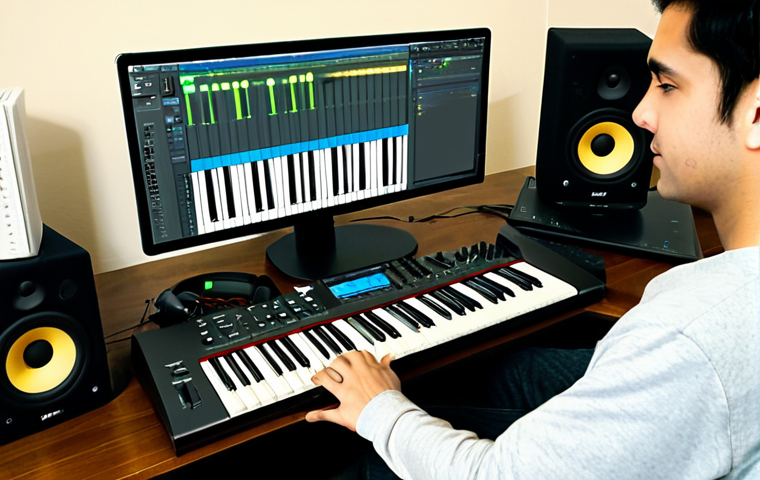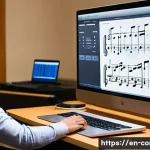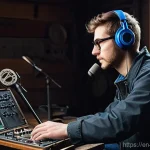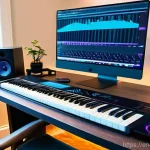So, you’re thinking about turning your passion for music into a legitimate career? Getting certified as a composer is one way to do just that! It’s like putting a stamp of approval on your talent, and honestly, it can open some serious doors in the industry.
Plus, with the rise of AI music generation, understanding the nuances of composition is more crucial than ever for standing out. The whole field is changing so rapidly; it’s wild!
Let’s dive into the nitty-gritty and explore exactly what it takes to get certified.
Alright, let’s get this blog post cooking!
What’s the Real Deal with Composer Certification?

So, you’re wondering what composer certification *actually* means. Think of it as a validation of your skills and knowledge in music composition. It’s not just about being able to write a catchy tune; it’s about understanding music theory, orchestration, arranging, and even the business side of things.
I remember when I first started out, I thought just knowing how to write music was enough. Boy, was I wrong! The industry wants to see that you’ve put in the work, that you understand the craft, and that you’re serious about your career.
That piece of paper, that certification, shows you’ve got the chops! It tells potential employers, clients, and collaborators that you’re not just winging it.
You’ve got the fundamentals down, and that’s huge in a field where “talent” can be a dime a dozen.
Diving Deeper: What Does Certification Cover?
When we talk about composer certification, we’re not just talking about one specific test or one specific skill. It encompasses a broad range of competencies.
Most certification programs will delve into music theory, harmony, counterpoint, orchestration, and arranging. I can personally attest to the need for ALL of these.
I remember working on a project once where I completely botched the orchestration. It sounded awful! Luckily, a seasoned composer stepped in and saved the day, but that experience really hammered home the importance of understanding every aspect of composition.
Why Bother? The Perks of Being Certified
Honestly, in a field as competitive as music composition, having that extra edge can make all the difference. It can boost your credibility and make you stand out from the crowd.
Think about it this way: if you’re hiring a composer for a film score, are you going to go with the person who just claims to be good, or the person who has a certification from a reputable institution?
I’d pick the certified person, hands down. And it’s not just about getting hired; it’s also about networking and building relationships. When you go through a certification program, you’re connecting with other composers, instructors, and industry professionals.
These connections can be invaluable as you navigate your career.
Navigating the Certification Landscape: Institutions and Programs
Alright, so you’re sold on the idea of getting certified. Now, where do you even start? The good news is that there are many reputable institutions and programs out there offering composer certification.
The not-so-good news is that it can be overwhelming to choose the right one. I always advise people to do their research, compare different programs, and talk to other composers who have gone through the process.
I’ve seen people waste a lot of time and money on programs that weren’t a good fit for them. Do your homework, ask questions, and make sure the program aligns with your goals and aspirations.
Spotting the Right Fit: What to Look For
When you’re evaluating different certification programs, there are a few key things to keep in mind. First, consider the reputation of the institution or organization offering the certification.
Is it a well-respected name in the industry? Does it have a track record of producing successful composers? Second, look at the curriculum.
Does it cover the topics and skills that are most important to you? Does it offer hands-on training and real-world experience? Finally, think about the cost and the time commitment.
Can you afford the tuition? Can you realistically balance the program with your other commitments?
A Few Standout Institutions to Consider
Okay, let’s get down to brass tacks. Which institutions should you be looking at? Well, that depends on your specific goals and interests.
But a few that consistently come up in conversation are Berklee College of Music (online programs make it accessible!), The Juilliard School (obviously), and various university music programs.
The Associated Board of the Royal Schools of Music (ABRSM) also offers internationally recognized certifications. But honestly, don’t just focus on the big names.
There are many smaller, lesser-known programs that can provide excellent training and support.
What’s the Investment? Cost and Time Commitment
Let’s talk brass tacks: money and time. Getting certified isn’t free, and it’s definitely not a weekend project. I remember almost choking when I saw the tuition fees for some of these programs.
But hey, think of it as an investment in your future! The cost can vary widely depending on the institution, the program length, and the level of certification.
Some programs may cost a few hundred dollars, while others can run into the thousands. And don’t forget to factor in the cost of materials, software, and equipment.
As for the time commitment, that can also vary widely. Some programs are designed to be completed in a few months, while others may take a year or more.
It’s all about finding a balance that works for you.
Breaking Down the Costs
So, what are the specific costs you need to be aware of? Well, tuition is the big one, obviously. But you also need to factor in the cost of books, sheet music, software (like notation programs), and equipment (like a MIDI keyboard or a microphone).
If you’re taking an online program, you may also need to upgrade your computer or internet connection. And don’t forget about travel expenses if you need to attend workshops or seminars.
It adds up quickly!
Managing Your Time Effectively
Time management is crucial when you’re pursuing composer certification. You need to be able to balance your studies with your other commitments, whether it’s a full-time job, family responsibilities, or other creative projects.
One tip is to create a schedule and stick to it as much as possible. Set aside specific times for studying, practicing, and working on assignments. And don’t be afraid to ask for help from your instructors, mentors, or fellow students.
We’ve all been there, feeling overwhelmed and stressed out.
Building Your Portfolio: Showcasing Your Skills
Alright, so you’ve got the knowledge and the certification. Now, how do you actually get work? The key is to build a strong portfolio that showcases your skills and experience.
This is where you get to show off your best work and demonstrate your ability to create music that resonates with audiences. I’ve seen composers with amazing talent get overlooked because they didn’t have a compelling portfolio.
Don’t let that be you!
What to Include in Your Portfolio
Your portfolio should include a variety of pieces that demonstrate your range as a composer. This could include scores for film, television, video games, or concert performances.
It could also include recordings of your music, either performed live or created using virtual instruments. If you have any collaborations with other artists, be sure to include those as well.
And don’t forget to include a professional headshot and a brief bio that highlights your accomplishments and experience.
Getting Your Work Seen and Heard
Creating a great portfolio is only half the battle. You also need to get your work seen and heard by the right people. This could involve submitting your music to film festivals, entering composition competitions, or networking with industry professionals.
Social media can also be a powerful tool for promoting your work and connecting with potential clients. Don’t be afraid to put yourself out there and share your music with the world.
The Role of Networking: Building Industry Connections
Speaking of networking, let’s talk about why it’s so important in the music industry. In a field as competitive as this, it’s not just about what you know; it’s about who you know.
Networking can open doors to new opportunities, collaborations, and career advancements. I’ve gotten some of my best gigs through word-of-mouth referrals from people I met at industry events.
Where to Network: Events and Online Communities
So, where do you actually go to network? Well, there are many different options, depending on your interests and goals. You could attend music conferences, film festivals, workshops, or masterclasses.
You could also join online communities, such as forums, social media groups, or professional organizations. The key is to be proactive and engage with others in your field.
Making a Lasting Impression

When you’re networking, it’s important to make a good impression. Be professional, be enthusiastic, and be genuinely interested in other people’s work.
Don’t just talk about yourself; ask questions and listen carefully to what others have to say. And always follow up with a thank-you note or email after meeting someone new.
It’s the little things that can make a big difference.
Table: Comparing Composer Certification Programs
Here’s a table summarizing some key aspects of different composer certification programs to help you compare:
| Program Name | Institution | Focus | Estimated Cost | Duration |
|---|---|---|---|---|
| Professional Scoring Certificate | Berklee Online | Film, TV, and Game Scoring | ~$3,000 | 12 months |
| Composition Studies | The Juilliard School | Classical Composition | ~$50,000/year | 4 years (Bachelor’s) |
| ABRSM Music Theory Exams | Associated Board of the Royal Schools of Music | Music Theory Fundamentals | Varies by Grade | Self-Paced |
| Film Scoring Program | University of Southern California (USC) | Advanced Film Scoring Techniques | ~$65,000/year | 1 year (Master’s) |
Staying Current: Adapting to Industry Changes
The music industry is constantly evolving, so it’s important to stay current and adapt to new technologies and trends. This means keeping up with the latest software, learning new composition techniques, and understanding the changing landscape of music distribution.
It also means being open to new opportunities and collaborations.
Embracing New Technologies
Technology has revolutionized the way music is created and consumed. From virtual instruments to digital audio workstations to streaming services, there are countless tools and platforms that composers can use to enhance their work and reach new audiences.
Embrace these technologies and learn how to use them to your advantage.
Continuous Learning and Skill Development
Never stop learning. The best composers are those who are constantly seeking new knowledge and skills. Attend workshops, take online courses, read books, and listen to a wide variety of music.
The more you learn, the better you’ll become at your craft.
Monetizing Your Music: Exploring Revenue Streams
Okay, let’s get down to business. How do you actually make money as a composer? The good news is that there are many different revenue streams you can explore.
The bad news is that it can be challenging to navigate the complex world of music licensing, royalties, and publishing.
Licensing and Royalties: Understanding the Basics
Licensing and royalties are the bread and butter of most composers. Licensing is the process of granting someone permission to use your music in a specific context, such as a film, a television show, or a video game.
Royalties are the payments you receive when your music is used commercially.
Exploring Different Revenue Streams
In addition to licensing and royalties, there are many other ways to monetize your music. You could sell your music directly to consumers through online stores or streaming services.
You could compose custom music for clients. You could teach composition lessons. Or you could even start your own music publishing company.
Alright, that’s a pretty comprehensive look at composer certification and how to navigate the music industry. Hopefully, this helps you on your journey!
Alright, let’s wrap this up!
Wrapping Up
So, there you have it – a deep dive into the world of composer certification. Remember, it’s not a golden ticket, but it’s a powerful tool in your arsenal. It demonstrates your commitment, validates your skills, and helps you stand out in a crowded field. Keep honing your craft, building your network, and embracing the journey. The music industry is tough, but with the right knowledge, skills, and connections, you can achieve your dreams. Now go out there and make some incredible music!
Handy Tips to Keep in Your Pocket
1. Network, Network, Network: Attend industry events, join online communities, and connect with other composers. Building relationships is key to finding opportunities and collaborations.
2. Craft a Killer Portfolio: Showcase your best work, highlighting your versatility and skill. Include scores, recordings, and collaborations.
3. Stay Current: Embrace new technologies, keep up with industry trends, and never stop learning.
4. Consider Internships: Practical experience is invaluable. Internships can provide real-world exposure and help you build your network.
5. Monetize Creatively: Explore multiple revenue streams, from licensing and royalties to selling your music directly to consumers. Think outside the box.
Key Takeaways
Composer certification can significantly enhance your credibility and career prospects.
Choose a certification program that aligns with your specific goals and interests.
Networking and building a strong portfolio are essential for success.
Continuous learning and adaptation are crucial in the ever-evolving music industry.
Monetizing your music requires a strategic approach to licensing, royalties, and other revenue streams.
Frequently Asked Questions (FAQ) 📖
Q: What’s the deal with composer certifications?
A: re they really worth the hassle? A1: Okay, so I get it, you’re skeptical! Honestly, before I got certified, I was too.
But think of it this way: in a super competitive world, a certification can give you that extra “oomph.” It proves you’ve met a certain standard of knowledge and skill.
I’ve definitely noticed it helps with getting clients to take me seriously, especially those big corporate gigs. It’s not a magic bullet, of course, but it shows you’re dedicated and have put in the work.
Plus, the process of studying for it forces you to level up your skills, which is always a good thing!
Q: So, what are the different types of composer certifications out there?
A: re some more valuable than others? A2: That’s a great question! It totally depends on what you want to specialize in.
There isn’t one universal “Composer Certification” – it’s more about finding one that aligns with your specific area. For example, if you’re into film scoring, you might look at certifications focused on orchestration or music production for visual media.
If you’re more into classical composition, there might be certifications offered by established music institutions or universities. Some are pretty niche, like focusing on video game music!
Honestly, the “value” depends on what your career goals are. Do your research, see what the big names in your area of interest recommend, and choose the one that will give you the most credibility in that field.
I’d suggest asking working composers for their input, too!
Q: Okay, I’m intrigued. What kind of skills do you actually need to pass a composer certification exam? Is it all theory, or do I actually need to write some decent music?
A: Haha, don’t worry, they’re not just going to grill you on the circle of fifths (although, brush up on that, too!). Honestly, it’s a mix of both theory and practical application.
You’ll definitely need a strong foundation in music theory, including harmony, counterpoint, orchestration, and form. But you’ll also need to demonstrate your ability to actually compose.
This often involves submitting original compositions, analyzing existing works, or even completing composition exercises under timed conditions. Think of it like this: you need to show you understand why music works and that you can use that knowledge to create something original and compelling.
It’s not enough to just know the rules; you have to show you can break them creatively!
📚 References
Wikipedia Encyclopedia





